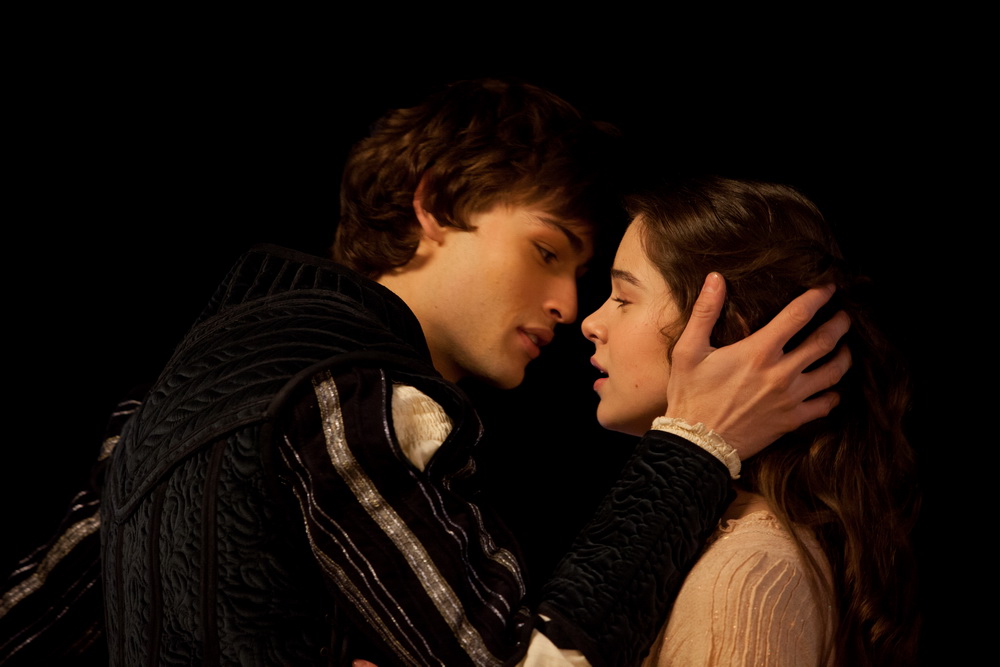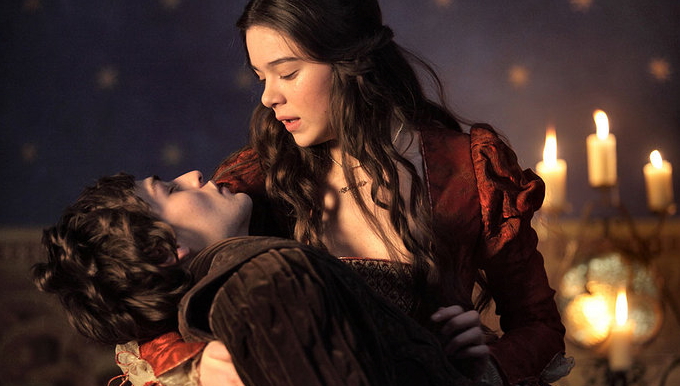ROMEO AND JULIET (review)
 ROMEO AND JULIET Directed by Carlo Carlei Written by Julian Fellowes Starring Hailee Steinfeld, Douglas Booth and Damian Lewis Romeo: What have I done but murdered my tomorrow?
ROMEO AND JULIET Directed by Carlo Carlei Written by Julian Fellowes Starring Hailee Steinfeld, Douglas Booth and Damian Lewis Romeo: What have I done but murdered my tomorrow?Over the years, there have been a many a great film and television adaptation of William Shakespeare’s classic tragedy, ROMEO AND JULIET, a tale of two star-crossed lovers. And if you include films like TROMEO AND JULIET, GNOMEO AND JULIET and of course, WEST SIDE STORY, there have also been numerous incarnations of the tragic love story as well. 1968’s version, starring Olivia Hussy and Leonard Whitting, is arguable the best adaptation of the play, while Baz Luhrmann’s ROMEO+JULIET, is probably the most fun, if not also the most freely adapted. So it begs the question, “Is another adaptation really necessary?” After viewing Carlo Carlei’s version, I can easily say that this is a film we could have definitely done without.
What is first striking and most noticeable about Carlei’s film is his choice in costumes and setting, in this case, the Renaissance route. The costumes are elaborate and adorned with shiny patterns and jewels, making everyone look like they are performers at a Medieval Times dinner theatre. Franco Zeffirelli’s version was also presented this way back in 1968, however the costumes weren’t as brightly coloured as they are in this version. But, as far as costumes go, they are quite beautiful, especially those worn by Juliet (Hailee Steinfeld). While the sets and locations are also quite stunning, there is one scene in particular that caused more than a few groans throughout the audience. During the scene where Romeo and Juliet are getting married, the interior of the church is so obviously a green screen effect that it looks about as authentic as a 1990’s video game.

The costumes and setting aren’t the only similarity to Zeffirelli’s classic film, and if you listen closely enough to the soundtrack of Carlei’s version, as composed by Abel Korzeniowski, you will hear it. Korzeniowski is paying homage to the 1968 version by borrowing a tune from Nino Rota’s famous score (which was popularized by Henry Mancini’s piano recording). It seems that Carlei, along with screenwriter, Julian Fellowes (“Downton Abbey”), was inspired by the success of that film to create something similar, but have instead, completely missed the mark altogether.
Baz Luhrmann’s adaptation may have brought the story into a modern setting and emphasized a mopey Romeo a little too much, but let’s be honest, there isn’t much else wrong with it. Leonardo DiCaprio and Claire Danes give heartbreaking performances. Even the dialogue stayed true to the original, which in Carlei’s version, it does not. Why would Fellowes change the dialogue from the original play? I cannot for the life of me think of a reason beyond timing, or perhaps Fellowes doesn’t think audiences are able to understand Shakespeare’s words. This might go unnoticed by some people, but for others, this change is rather jarring. It might be a simple word here and there, but in other instances, entire phrases have been changed.
Take this line from the movie spoken by Friar Laurence (Paul Giamatti): “These violent passions can have violent ends.”
and then compare it to the actual line: “These violent delights have violent ends.”
The change in this line results in a completely different meaning, so why have these changes been made? Why has Shakespeare’s rich and meaningful dialogue been modified in this way?
Or take this example spoken by Tybalt (Ed Westick):
“Romeo! Come settle with me, boy!” which should be
“Boy, this shall not excuse the injuries that thou hast done me; therefore turn and draw.”
This isn’t William Shakespeare, people. This is condescending.
Perhaps the screenplay wouldn’t have been as noticeably insulting though if the lines weren’t delivered with such a complete lack of emotion. The two leads, Steinfeld (TRUE GRIT) and relative unknown, Douglas Booth, appear to have no connection to the lines whatsoever, as if they are repeated by rote. If the performances themselves in a Shakespeare play aren’t good, then it unfortunately throws the entire production off. Even performances by Natascha McElhone (who gasps every 5 minutes) and Giamatti as the Friar, seem stilted as if they’re uninterested in what they are doing. Who could blame them though given what they’re working with? There was one surprise; even though he is not an actor I’ve generally appreciated in the past, Westwick as Tybalt, is one of the best in the entire film. Too bad it is also one of the shortest.
So, back to my original question; is another ROMEO AND JULIET adaptation really necessary? I openly admit that I do love me some Shakespeare, and I welcome film adaptations of his works with open arms. There have been many failed attempts, but there have also been many that are amazing in so many new ways. Unfortunately, Carlei’s “adaptation”, if we can really call it that at the end of the day, isn’t one of the better versions to come along in recent years, or even in not so recent years, for that matter. His decision to modify the dialogue will insult and deter one potential audience, and the robotic delivery from all involved will leave everybody else feeling rather unsatisfied.
Your turn!
How many sheep would you give Romeo and Juliet (2013)?
[kkstarratings]










Like a bad musical, I walked away from this humming the costumes and art direction. This is Romeo and Juliet for the Abercrombie & Fitch crowd.
I totally disagree! Emotional, visually stunning, great cast, great score. This is not a play, it is a movie.
I agree with Debbie; this movie was emotionally charged and Paul Giamatti performance was exceptional. This movie is just as good as the original in 1969 (that I also saw).
I agree with Debbie and Fran
That’s great that you disagree!, that’s what makes for good discussion. Although I feel saying it is “emotionally charged” or “good as the 1968 version” is a bit of a stretch IMHO. The leads had zero chemistry together. Someone said this is Shakespeare for the Abercrombie crowd, and I couldn’t agree more, the dialogue was dumbed down in such a way that it lost the beauty of his words. This isn’t an adaptation, it’s a reimagining that only focused on the main points, basically it’s the sparksnotes version.
I enjoyed the movie nonetheless.